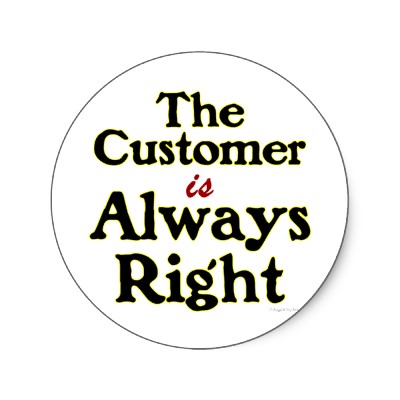Last Updated on July 20, 2020 by DJ
Author’s note: I received a response from the author of The Customer As A God: The Future of Shopping, Doc Searls. You can find that response in the comments, but what you need to know is that the content of his article in the Journal is not completely in line with the title of the piece. Sure, the title is ridiculous, but Doc didn’t choose it and doesn’t deserve to have his writing dismissed based upon a title he didn’t choose. Actually, Doc’s article inspired me to write about my own thoughts on the optimal Client-Advisor relationship, but I chose snark over sensitivity in the lead-in and that was unfair to Doc and his original article, which I encourage you to read for yourself. As it turns out, Doc and I actually agree on the ideal relationship between vendor and customer, advisor and client, so, please, read on! (But ignore the intro).
The WSJ’s Prediction
 The Wall Street Journal hit a viral vein this week with a piece called The Customer as a God: The Future of Shopping. This is the type of underwhelming “read-me please!” title/post combination I usually balk at, but, as customers and clients are definitely of the same ilk, I quickly theorized what kind of world an advisor might be in should he/she treat his/her clients as a God. That world would be hell.
The Wall Street Journal hit a viral vein this week with a piece called The Customer as a God: The Future of Shopping. This is the type of underwhelming “read-me please!” title/post combination I usually balk at, but, as customers and clients are definitely of the same ilk, I quickly theorized what kind of world an advisor might be in should he/she treat his/her clients as a God. That world would be hell.
What a ridiculous notion, the customer as a God! But, as the future (allegedly) has it, a world where customers are worshipped is indeed a likely one, or so claims the WSJ. Despite my better judgement I read the thing in bitter disapproval, not of the WSJ’s predictions, but of the inkling that treating customers as Gods might be anywhere close to a good idea. Please allow me to offer a more reasonable, less sensationalist summation of the optimal state of customer relationships.
My Assessment
When the Journal likens the customer to a God, what they’re trying to say is that vendors are overcompensating for years of customer abuse. At this point it’s old news that the power dynamic in business has shifted, largely due to social media. Where we once had companies and services creating products and solutions as they saw fit, now we have consumers and clients telling companies and providers what they want. But this is where it gets confusing, because not all companies are listening and complying with their customers requests, at least not all of the time, and I’m not sure that anyone can be sure if the novelty factor of social media has worn off yet–when will people stop tweeting about their lousy experience at the Applebee’s in the mall parking lot? But I digress, vendors as tyrants, clients as dictators… neither are ideal.
The optimal state of affairs for customer/vendor, client/advisor relationships is no different from any other relationship: they ought be healthy, balanced, open, and above all be characterized by mutual respect.
Here’s a secret, people are dumb. It’s true! And it’s not dumbness as in a lack of knowledge, it’s dumbness as in ignorance. People (read: clients, customers, neighbors, employees, etc.) think they know things, or pretend they do or convince themselves they do, when they really don’t. If one tried to listen and cater to every client request ever, we’re back in the client-as-a-God-is-Hell-scenario. If one ignores completely everything that their clients are saying and pretends they know what is best for them, then we are in ye olden days of mass appeal corporate dictatorship–again, not ideal. Obviously clients and vendors need each other, and common sense would have it that they would understand and appreciate this, which would result in mutual respect, but clearly this is not the case…
My Advice: Compromise
Advisors, listen to your clients. Really listen. Acknowledge their feedback, thoughts, and requests, and wait. Wait until you start seeing a pattern of similar thoughts/feedback/requests, and then combine these similar sentiments with your own and implement something. Give ample time for the afraid-of-change/work-out-the-kinks period to subside, and then test to see if you’ve had a positive impact. If the change seems to be mutually beneficial, it stays, if it’s crushing you or causing your clients more pain, ditch it.
No matter how it plays out in the end, if your clients feel that they’re being heard (that’s the bare minimum), they will at least hear you in return. That way when you sigh and say, “sorry, can’t do it,” you won’t have an enraged ex-client talking on Twitter about how much of a jerk you are. #WorstAdvisorEver
